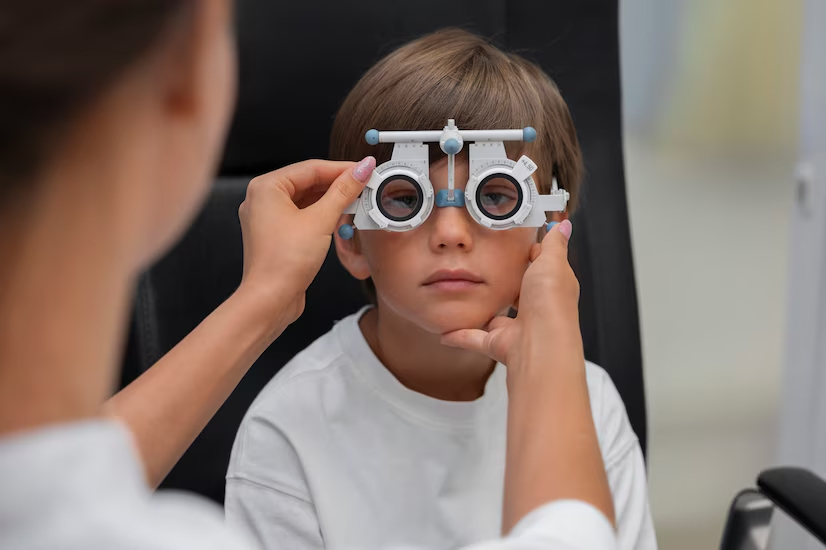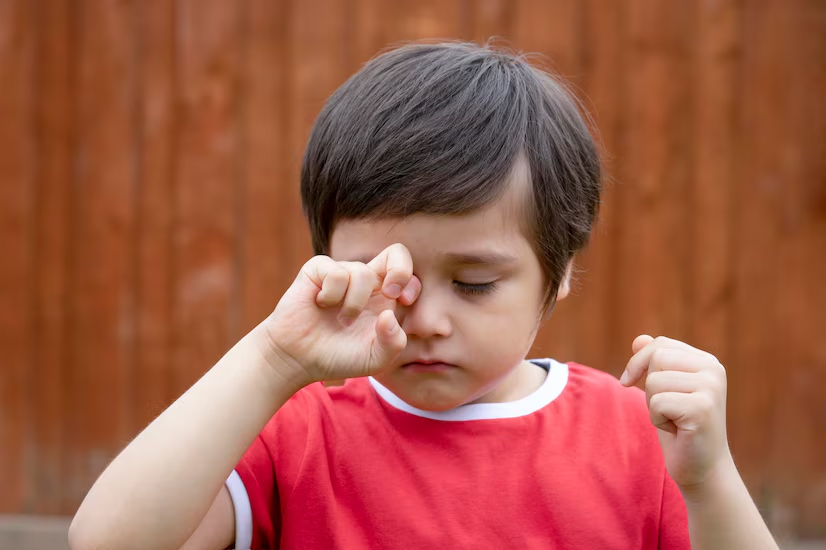
In the world of growing technology, electronic gadgets are handy to kids from a very young age of 2-3 years. Busy moms have started using ‘Peppa Pigs’ and ‘Cocomelon’ videos so that their kids finish their food faster and they can get free. Don’t be surprised if you see a 2-3-year-old baby scrolling through Instagram reels, as it is the easiest way to keep the kids entertained so that parents are not disturbed by them. But, this constant usage of screens can harm the eyesight of your child at a very young age.
Table of Content:-
Parents need to ensure that the eye health of their child is maintained. Ensuring your child’s eyesight is crucial for their overall development and well-being. OnlyMyHealth team spoke to Dr Kishore Kumar, Paediatrician, and Neonatologist, Cloudnine Group of Hospitals, Bengaluru, to understand how parents can keep their child’s eyesight in check.
According to Dr Kumar, good vision supports learning, social interactions, and physical activities. Here are some tips approved by Dr Kumar to help keep your child’s eyesight in check.
1. Regular Eye Examinations
Dr Kumar emphasised routine eye exams as they are essential for detecting any vision issues early. “All babies should have their eyes examined at birth for any abnormalities or anomalies. Also, every baby should have the Red Eye Reflex examination to ensure there is no congenital cataract which can impair visual development,” he said. After birth, every time the child visits the paediatrician for vaccinations, an eye examination is essential as the child "starts making eye contact and smile" by 6 to 8 weeks. The American Optometric Association recommends that children have their first comprehensive eye exam at six months, again at three years, and just before starting school. After that, school-aged children should have their eyes examined every two years, or more frequently if recommended by an eye care professional.

Also read: Foods To Keep Your Eyesight Sharp And How To Avoid Cataract?
2. Healthy Diet
Nutrition plays a significant role in maintaining good eye health according to Dr Kumar. In countries like India, vitamin A deficiency is very common and one of the important causes of eye problems, hence Dr Kumar suggested that parents should consider vitamin A drops at 9 months of age. He further said, “Encourage your child to eat a balanced diet rich in fruits, vegetables, and omega-3 fatty acids. Foods like carrots, spinach, kale, and fish are excellent for eye health. These foods are high in vitamins A, C, and E, and nutrients like lutein and zeaxanthin, which help protect the eyes from damage.”
3. Limit Screen Time

Excessive screen time can lead to digital eye strain, which includes symptoms like headaches, blurred vision, and dry eyes. Dr Kumar said that screen time is known to delay speech development and selective mutism. The American Academy of Child and Adolescent Psychiatry recommends not more than one hour of screen time per day for children aged 2 to 5, and consistent limits for older children.
4. Proper Lighting
Advising parents, Dr Kumar said, “Ensure that your child has adequate lighting when reading, doing homework, or using a computer. Dim lighting can cause eye strain. Use desk lamps with adjustable brightness and ensure screens are positioned to minimise glare.”
5. Outdoor Play
Spending time outdoors is beneficial for eye health. Studies suggest that natural light can help reduce the risk of developing myopia (nearsightedness). Encourage your child to play outside for at least one to two hours a day.
Also read: Myopia In Children: What Parents Can Do To Manage The Condition
6. Teach Good Hygiene
Dr Kumar said, “Instruct your child to wash their hands regularly and avoid touching their eyes to prevent infections like conjunctivitis (pink eye).” If your child wears glasses or contact lenses, ensure they follow proper hygiene practices to keep them clean and in good condition.
7. Monitor for Signs of Vision Problems

“Be alert to any signs that might indicate a vision problem,” Dr Kumar advised adding, “These can include frequent eye rubbing, squinting, sitting too close to the TV, complaining of headaches, or difficulties in school.” If you notice any of these signs, schedule an eye exam with an optometrist or ophthalmologist.
8. Encourage Eye Exercises
Simple eye exercises can help improve eye coordination and strength. Citing the example of eye exercises, Dr Kumar said, “Activities such as focusing on a distant object for a few seconds and then shifting to a near object can be beneficial. Additionally, playing with toys that enhance hand-eye coordination, such as building blocks and puzzles, can support visual development.”
Conclusion
Keeping your child’s eyesight in check involves a combination of regular eye exams, a healthy diet, balanced screen time, proper lighting, outdoor activities, protective eyewear, good hygiene, vigilance for signs of vision problems, eye exercises, and knowledge of family eye health history. By following these expert-approved tips, you can help ensure that your child’s vision remains sharp and healthy, supporting their overall development and quality of life.
(Disclaimer: This article is for informational purposes only. We advise you to consult your healthcare provider if your child is going through any eyesight problems.)
Also watch this video
How we keep this article up to date:
We work with experts and keep a close eye on the latest in health and wellness. Whenever there is a new research or helpful information, we update our articles with accurate and useful advice.
Current Version